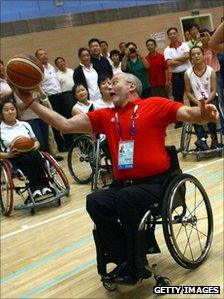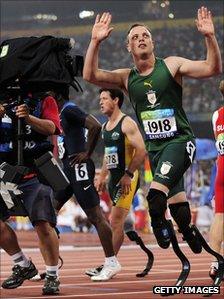London 2012: Could the 2012 Paralympics erase the word 'disability'?
- Published
- comments

Sir Philip thinks the word "disabled" has negative connotations
As <link> <caption>International Paralympic Day</caption> <url href="http://www.bbc.co.uk/news/uk-england-london-14819063" platform="highweb"/> </link> takes place in London to celebrate next year's Games, Sir Philip Craven, the president of the International Paralympic Committee, has said he refuses to use the "D-word".
Sir Philip believes London 2012 will help to consign it to history.
Disabled himself, and a former wheelchair basketball player, he explains his dislike to BBC News: "It needs to be removed from the lexicon as it pertains to human beings.
"I mean, let's face it, if a machine gets disabled, it doesn't work. And that is the way that the word has influenced people's minds in the past.
"People say: 'Peter round the corner, he's disabled', before they even start to talk about what a wonderful guy he is, or what a not-so-nice guy he is. You immediately get to that differentiating point.
"If you're going to be talking about the positivity of human kind, why kick off with negativity?
"Someone said to me recently that [disability] is very much a political word for differentiation.
"I'm not getting into politics but if you think about it, it normally doesn't need to be used. What does ' you are disabled' mean?
"There's an incredible difference between a wheelchair user and someone who's blind, you know."
Though Sir Philip may dislike the term "disabled", many identify strongly with it and believe it is helpful.
Changing perceptions
Campaigner Clair Lewis sees it as a word that unifies the community.
"It's quite common for one group of disabled people to say to another that they don't want to be like them. Changing the word doesn't actually fix anything."
<link> <caption>For 12 days next year, 4,200 athletes from 160 nations will be descending on the city of London.</caption> <url href="http://news.bbc.co.uk/sport1/hi/disability_sport/14662054.stm" platform="highweb"/> </link> Although it is unlikely to significantly change the language, there are some tangible benefits that will be left behind as a result.
In its Olympic and Paralympic bid in 2005, London promised to create the most accessible Games ever.
Agencies such as Transport for London, the Olympic Park Legacy Company and the Department for Culture Media and Sport all have a role to play in keeping the promise during, and also after, the games.

In 2008, 90,000 people cheered on Oscar Pistorius to a Beijing win
The Olympic Park will see 8,000 new houses built on it after the games.
About nine per cent of these will be wheelchair accessible. And the sporting venues, some of which will be scaled back, were created with high accessibility standards and will remain.
The School Games project aims to build a lasting competitive sports structure in schools across the country.
Disability sport is part of this and specific inclusive events will be held at the Games next year.
Future disability sport opportunities are built into this plan and, for the first time, disabled children's participation in sport will be measured.
Maria Miller, minister for disabled people, said: "The Games offer a great opportunity to challenge outdated perceptions and help make further progress towards equality for disabled people in the UK.
"They will showcase the talents and sporting expertise of disabled people competing on a world stage and act as a catalyst for our sporting talents of the future.
Positive legacy
"I am really pleased by the initiatives under way to develop and strengthen disability sport and I hope we are left with a lasting positive legacy for disabled people and a positive experience for all in 2012."
It is worth looking back as well as forward.
In 1912, exactly 100 years before the London Paralympics, the city played host to an entirely different disability event.
The first international eugenics conference was held in the city, bringing together sympathisers and academics, including prime minister-in-waiting Winston Churchill, to discuss issues like sterilisation, selective breeding and marriage restriction.
For 2012, London has moved a long way from wanting to eradicate disabled people, preferring to celebrate their lives and achievements.
Perceptions have changed vastly across the last century. Sir Philip thinks that attitude is the key factor.
"You can pass laws and laws are necessary; we have the equality law now in Britain but laws are only there for me as a backstop.
"The thing that really makes a difference is the change in public perception and that's what the Paralympic games brings to a nation.
"And now that they're televised quite extensively, and will be more than ever in London - also on radio and internet and press - then that message gets out to the world. And this is what we want."
- Published8 September 2011
- Published23 May 2012
- Published13 September 2011